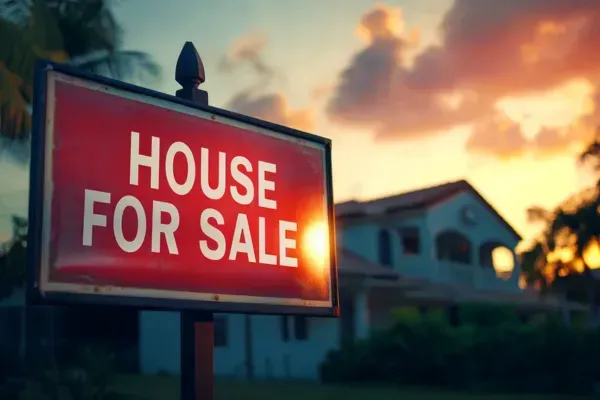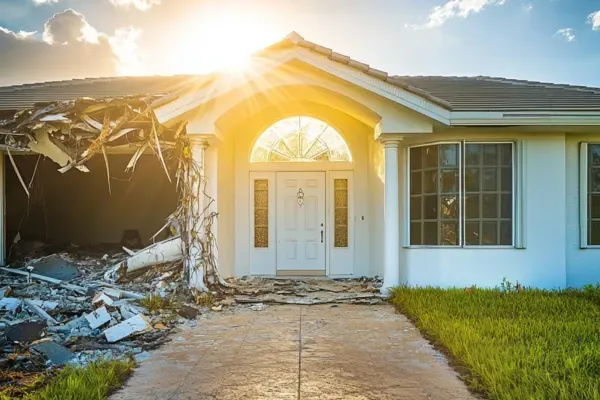
How to Sell a Damaged House Fast in Florida
Selling a damaged house in Florida can feel like an overwhelming challenge, especially when natural disasters or unexpected issues leave your property in need of significant repairs. Whether your home has been impacted by a hurricane, flood, or other structural concerns, you’re not alone in navigating this complex process. Florida’s unique climate and economic landscape make it a hotspot for homeowners facing property damage, but with the right knowledge and strategies, you can explore options that align with your needs. This comprehensive guide will walk you through the steps, solutions, and considerations for selling a house with damage, offering practical advice to help you move forward with confidence. From understanding the impact of specific damages to finding buyers who specialize in distressed properties, we’ll cover everything you need to know to make informed decisions.

Understanding the Challenges of Selling a Damaged House
When a home sustains damage, whether from natural disasters or other issues, it can significantly complicate the selling process. Florida homeowners face unique challenges due to the state’s vulnerability to hurricanes, floods, and other environmental factors. According to a 2023 report by the Insurance Information Institute, Florida accounted for 79% of all homeowners’ insurance claims related to natural disasters in the U.S., highlighting the prevalence of property damage in the state (Insurance Information Institute, 2023). These damages can range from hurricane damage to mold issues, each presenting distinct hurdles for sellers.
The financial burden of repairs is often a primary concern. Fixing a house with structural issues or roof damage can cost tens of thousands of dollars, which may not be feasible for everyone. For example, repairing a roof damaged by a hurricane can range from $8,000 to $20,000, depending on the extent of the damage and materials used. Similarly, addressing termite damage can involve costly treatments and structural repairs, sometimes exceeding $10,000 in severe cases. Traditional buyers may shy away from properties requiring such extensive work, leading to longer selling times or lower offers. However, specialized buyers, such as cash buyers, often seek out these properties, offering a lifeline for homeowners looking to sell house fast without sinking money into repairs.
The emotional toll of selling a damaged home can also be significant. Homeowners may feel attached to their property, especially if it’s been their home for years, making the decision to sell a house with fire damage or flood damage particularly challenging. Additionally, navigating Florida’s competitive real estate market, where buyers often expect move-in-ready homes, can add pressure. Understanding the specific challenges of your situation—whether it’s smoke damage from a fire or code violations from unpermitted work—can help you approach the process with clarity and purpose.
Common Types of Damage Impacting Home Sales
- Hurricane Damage: High winds and flooding can cause significant structural and cosmetic issues, such as broken windows or compromised roofs.
- Flood Damage: Water intrusion can lead to mold growth and weakened foundations, requiring extensive remediation.
- Fire Damage: Smoke and structural repairs can deter traditional buyers, often necessitating costly restoration.
- Termite Damage: Hidden infestations can weaken a home’s framework, sometimes going unnoticed until inspection.
- Code Violations: Unpermitted additions or safety issues may require expensive corrections to meet local regulations.
Each type of damage requires a tailored approach. For instance, selling a house with mold may involve addressing health concerns, while selling a house with foundation issues might require engineering reports to reassure buyers. By identifying the specific damage, you can better strategize your next steps, whether that’s making repairs or seeking buyers who specialize in distressed properties.
Assessing Your Home’s Damage: Where to Start
Before you can sell a damaged house, it’s crucial to assess the extent of the damage and understand its impact on your property’s value. Start by hiring a professional inspector or contractor to evaluate the damage thoroughly. This step provides clarity on whether repairs are necessary or if selling “as-is” is a better option. For example, a house with storm damage may require roof repairs costing upwards of $15,000, while a house with water damage might need mold remediation or plumbing fixes, which can range from $2,000 to $10,000 depending on severity.

A thorough inspection can uncover hidden issues that might affect your sale. For instance, termite damage may not be visible to the untrained eye but could significantly impact a home’s structural integrity. Similarly, smoke damage from a fire can linger in walls and HVAC systems, requiring specialized cleaning. Documenting these issues with photos and detailed reports is essential for transparency with potential buyers and for filing insurance claims if applicable.
Steps to Assess Damage
- Hire a Professional: A licensed inspector can identify hidden issues, such as structural problems or code violations, ensuring nothing is overlooked.
- Document Everything: Take photos and compile a detailed report of all damages to share with potential buyers or insurers.
- Get Repair Estimates: Obtain quotes from at least three contractors to compare costs for fixing issues like roof damage or mold.
- Check for Code Violations: Ensure your home complies with local regulations, as unaddressed violations can delay or derail a sale.
- Consult an Appraiser: A professional appraisal can help you gauge how damage affects your home’s market value, especially for houses with foundation issues.
Save time and money by obtaining at least three repair estimates from licensed contractors to ensure you’re getting a fair price and a clear picture of the damage scope.
This assessment will guide your decision-making process, helping you weigh the costs of repairs against the benefits of selling the property in its current condition. For example, addressing flood damage might involve replacing flooring and drywall, but if the costs outweigh the potential increase in sale price, an as-is sale might be more practical. Knowing the full scope of the damage empowers you to make informed choices tailored to your financial and personal circumstances.
Options for Selling a Damaged House
Once you’ve assessed the damage, you’ll need to decide how to proceed with selling your home. Florida homeowners have several options, each with its own benefits and considerations. The best choice depends on your financial situation, timeline, and the extent of the damage, whether it’s fire damage or hurricane damage.
Selling As-Is to Cash Buyers
Selling your home “as-is” to cash buyers or investors is often the fastest and least stressful option for homeowners dealing with significant damage. These buyers specialize in properties with issues like storm damage, smoke damage, or mold, offering cash deals that can close in as little as 7-14 days. This is particularly appealing for those facing urgent situations, such as foreclosure or relocation, where time is of the essence.
- Pros: No repair costs, fast closings, no need to stage or market the home, and minimal paperwork.
- Cons: Offers may be lower than market value due to the condition of the property, typically 60-80% of the home’s repaired value.
Cash buyers are often real estate investors or companies that purchase homes to renovate and resell. They’re accustomed to handling houses with structural issues or code violations, making them a viable option for homeowners who can’t afford or don’t want to invest in repairs.
Listing with a Real Estate Agent
Working with a real estate agent to list your home on the traditional market is another option, though it may require some repairs to attract buyers. For homes with water damage or roof damage, minor fixes, such as patching drywall or replacing a few shingles, can make the property more appealing. However, this approach often involves a longer timeline, as traditional buyers may request inspections and negotiate repairs.
- Pros: Potential for higher offers from traditional buyers, especially in Florida’s competitive markets like Tampa or Sarasota.
- Cons: Longer selling process (30-90 days), repair costs, and agent commissions (typically 5-6% of the sale price).
Selling to a Developer
In some cases, developers may be interested in houses with structural issues or code violations, particularly in desirable Florida neighborhoods. They may plan to renovate or rebuild entirely, making them less concerned about the home’s current condition. This option is especially relevant for properties in high-demand areas where land value outweighs repair costs.
- Pros: Can yield competitive offers in sought-after locations, potentially closer to market value.
- Cons: Limited to specific areas and may involve longer negotiations or zoning checks.
Checklist for Choosing the Right Selling Option
- Evaluate your timeline: Do you need to sell within weeks, or can you wait months?
- Consider your budget: Can you afford minor repairs, or is an as-is sale more practical?
- Research local buyers: Look for reputable cash buyers or investors with experience in hurricane damaged houses.
- Consult professionals: Speak with real estate agents or attorneys to understand your options and legal obligations.
- Assess market conditions: In a seller’s market, you may attract more buyers despite damage.
Navigating Repairs: To Fix or Not to Fix?
Deciding whether to repair your damaged house before selling is a critical step that can impact your timeline, finances, and sale price. For some damages, like water damage or termite damage, minor fixes can improve your home’s appeal and attract more buyers. For example, replacing damaged flooring or treating mold can cost $2,000-$5,000 but may increase your home’s value significantly. However, major repairs, such as those for foundation issues or hurricane damage, can be prohibitively expensive, often ranging from $20,000 to $50,000 or more.
Factors to Consider Before Repairing
- Cost vs. Benefit: Will repairs significantly increase your home’s value? For instance, fixing roof damage might cost $12,000 but could boost your sale price by $25,000 in a competitive market.
- Market Conditions: In a seller’s market, buyers may overlook minor damages, but in a buyer’s market, repairs might be necessary to stand out.
- Buyer Type: Cash buyers often purchase houses with mold or smoke damage as-is, eliminating the need for costly fixes.
- Time Constraints: If you’re facing urgent financial pressures or a job relocation, investing time and money in repairs may not be feasible.
- Insurance Coverage: If your damage is covered by insurance, such as flood damage from a storm, filing a claim could offset repair costs.
According to a 2024 study by the National Association of Realtors, 60% of homeowners who sold distressed properties opted to sell as-is to avoid repair costs, particularly in high-risk areas like Florida where natural disasters are common (National Association of Realtors, 2024). This trend highlights the growing popularity of as-is sales for homes with significant damage, especially in coastal regions prone to hurricanes and flooding.
Always disclose known damages to potential buyers to avoid legal issues later. Transparency about fire damage or code violations can build trust and attract serious offers, even for homes with significant issues.
Marketing a Damaged House Effectively
Marketing a damaged house requires a strategic approach to attract the right buyers while being transparent about its condition. Whether you’re targeting cash buyers or traditional buyers, highlighting the potential of your property is key. For homes with flood damage or storm damage, emphasizing the location, lot size, or redevelopment potential can draw interest from investors or buyers looking for a fixer-upper.
Tips for Marketing Your Damaged House
- Be Transparent: Clearly disclose damages like mold or structural issues in your listing to set realistic expectations and avoid surprises during inspections.
- Highlight Positives: Focus on your home’s strengths, such as its proximity to beaches, schools, or urban centers in Florida, or its potential for renovation.
- Use Professional Photos: Even damaged homes benefit from high-quality images that showcase the property’s layout and potential, despite issues like smoke damage.
- Target the Right Audience: Market to investors or buyers looking for fixer-uppers, especially for houses with termite damage or code violations.
- Leverage Online Platforms: List your home on sites like Zillow, Redfin, or specialized platforms for distressed properties to reach cash buyers.
Sample Marketing Description
“Unique opportunity in St. Petersburg! This spacious fixer-upper sits on a large lot in a vibrant neighborhood, perfect for investors or buyers ready to create their dream home. With some hurricane damage, this property offers incredible potential for those looking to renovate and add value.”
When marketing, consider the emotional appeal of your home’s story. For example, a home with fire damage might still have a strong foundation and a desirable location, making it attractive to buyers who see beyond the current condition. Tailoring your listing to highlight these aspects can make a significant difference in attracting offers.
Legal and Financial Considerations
Selling a damaged house in Florida involves navigating a range of legal and financial considerations to ensure a smooth and compliant transaction. Florida law requires sellers to disclose known defects, including fire damage, water damage, or termite damage, to avoid potential lawsuits or disputes after the sale. Failing to disclose mold or structural issues could lead to legal repercussions, so consulting a real estate attorney is advisable to ensure compliance.
Key Legal Steps
- Complete a Seller’s Disclosure: Document all known issues, such as smoke damage or foundation problems, in a written disclosure form to provide to buyers.
- Check for Liens or Violations: Ensure there are no outstanding code violations or liens on the property, as these can delay or prevent a sale.
- Understand Tax Implications: Selling a damaged home at a loss may have tax consequences, especially if you’ve claimed insurance payouts. Consult a tax professional for guidance.
- Review Contracts Carefully: Work with a real estate attorney or agent to review offers, particularly from cash buyers, to ensure terms are fair and protect your interests.
- Address Insurance Claims: If your home sustained hurricane damage or flood damage, ensure all insurance claims are resolved before closing to avoid complications.
Financial Considerations
- Repair Costs: Weigh the cost of fixing issues like roof damage or mold against potential increases in sale price. For example, mold remediation can cost $500-$6,000, depending on the extent of the issue.
- Closing Costs: Factor in fees, taxes, and agent commissions (if applicable), which can total 8-10% of the sale price in a traditional sale.
- Insurance Payouts: If your damage is covered by insurance, such as storm damage, use payouts strategically to either fund repairs or offset a lower sale price.
- Market Value Impact: Damaged homes typically sell for 10-30% less than comparable undamaged properties, depending on the severity of the issues.
Working with professionals, such as a real estate agent or attorney, can help you navigate these complexities. For instance, addressing code violations before listing can prevent delays, while understanding the financial impact of termite damage can help you set realistic expectations for offers.
Moving Forward with Confidence
Selling a damaged house in Florida may seem like a daunting task, but with the right approach, you can turn challenges into opportunities. Whether your home has been affected by flood damage, hurricane damage, or other issues, there are buyers and solutions available to meet your needs. The key is to approach the process with a clear understanding of your home’s condition, market dynamics, and available options. By assessing the damage thoroughly, you can decide whether minor repairs, such as fixing water damage, make sense or if an as-is sale to a cash buyer is the best path.
Exploring options like cash buyers can simplify the process, especially for homes with smoke damage or structural issues, where repairs might be cost-prohibitive. Alternatively, marketing your home strategically to highlight its potential can attract traditional buyers or developers, particularly in Florida’s high-demand areas. Regardless of the path you choose, transparency is critical—disclosing all damages, such as mold or code violations, builds trust and protects you legally.
The emotional and financial weight of selling a damaged home can feel heavy, but you don’t have to navigate it alone. Resources like professional inspectors, real estate agents, and attorneys can provide the support you need to make informed decisions. By taking proactive steps—such as documenting damage, researching buyers, and understanding market conditions—you can move forward with confidence.
Florida’s real estate market offers unique opportunities for homeowners with damaged properties, thanks to the state’s active investor community and demand for fixer-uppers. Whether you’re dealing with fire damage, termite damage, or hurricane damaged houses, there’s a solution that fits your timeline and financial goals. This guide has provided a roadmap to help you navigate the process, from assessing damage to closing the sale. By staying informed and exploring all available options, you can find the best path forward for your unique situation, turning a challenging moment into a new beginning.

Ready to explore your options for selling your damaged house in Tampa, Bradenton, Sarasota, or nearby areas? Contact us today for a hassle-free cash offer!
References
- Insurance Information Institute. (2023). Facts + Statistics: Homeowners and Renters Insurance. Retrieved from www.iii.org.
- National Association of Realtors. (2024). 2024 Home Buyers and Sellers Generational Trends Report. Retrieved from www.nar.realtor.
More Topics for You:
Home Sellers Resources:
We Offer a Free Consultation. Find Answers Faster & Easier!
A Florida Offer Professional Will Call You
© 2026 Florida Offer. All rights reserved.






